Macron vows tireless work to free French couple in Iran jail
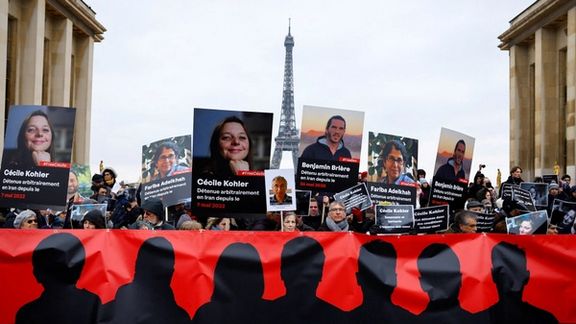
French President Emmanuel Macron said on Wednesday that France is working tirelessly to secure the release of a French couple detained for three years in Iran on spying charges.

French President Emmanuel Macron said on Wednesday that France is working tirelessly to secure the release of a French couple detained for three years in Iran on spying charges.
Cecile Kohler, a 40-year-old literature teacher, and her partner Jacques Paris, in his 70s, were arrested on May 7, 2022, during a tourist trip to Iran.
Both Paris and Kohler were subject to inhumane detention conditions including forced false confessions on state TV.
Several Europeans are being held by Tehran, which France and other European nations consider a strategy of hostage-taking to gain concessions.
"I assure their families that our support is unwavering," Macron wrote on social media platform X, referring to the couple as "hostages."
According to their families, Kohler and Paris are being held in extremely difficult conditions.
Kohler's sister, Noemie, who leads the campaign for their release, said the couple are becoming increasingly desperate and losing hope.
In March, French citizen Olivier Grondeau was released from 887 days in detention in Iran.
France has denied the spying charges against its citizens and demanded their immediate release.
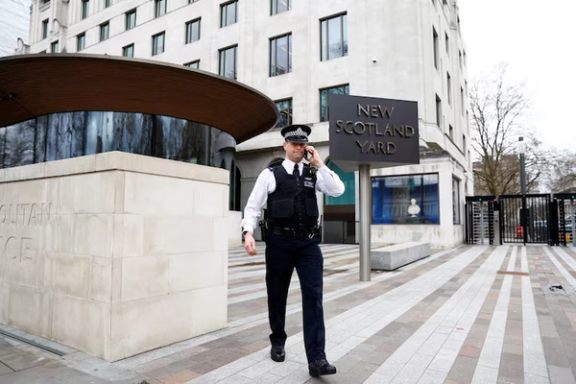
The arrest of five Iranian nationals on terror charges across the UK has led to renewed calls by lawmakers to designate Iran’s Islamic Revolutionary Guard Corps (IRGC) as a terrorist organization.
Security Minister Dan Jarvis told Parliament on Tuesday that the arrests marked "the first Iranian nationals arrested under the National Security Act.”
He said the Iranian state—including the IRGC and the Ministry of Intelligence and Security—had previously been placed on the enhanced tier of the foreign influence registration scheme.
“Anyone in the UK who works for the Iranian state must declare it or they will be committing a serious criminal offence,” he added.
The arrests, made on May 4 in London, Rochdale, Swindon, Manchester and Stockport, involved five men held under the Terrorism Act 2006 and three more under the National Security Act. Four remain in custody. Authorities believe the group was only hours away from attacking a specific location.
The Telegraph reported that at least one of the suspects is closely tied to the Islamic Republic’s leadership and comes from a prominent business family.
Jarvis said MI5 and police have responded to 20 Iran-backed plots since January 2022.
Liberal Democrat MP Lisa Smart criticized the government, saying, “Over recent years Members have been called to this Chamber to discuss plots to commit acts of terror on Britain’s streets at the hands of the Iranian regime—but consecutive Governments are yet to proscribe the Islamic Revolutionary Guard Corps as a terrorist organization.”
“If now is not the time for proscription, when should the House expect a further update?” she asked.
Labor’s Matt Vickers recalled the Home Secretary’s previous commitment to impose “appropriately targeted proscription-style restrictions” on state-linked entities such as the IRGC.
Labor and Co-operative MP Alex Sobel protested that he “asked many times for proscription of the IRGC, as it is certainly one of the bodies in Iran that is responsible for transnational repression,” while Labor MP Jon Pearce raised concerns that UK-based charities may be used to fund terrorism.
According to the government, a review of legal options by Jonathan Hall, an independent barrister, has been completed and will be published soon. Ministers have said they will not hesitate to act based on the findings.
Meanwhile, exiled Iranian prince Reza Pahlavi called the arrests further proof of what he calls Tehran’s global threat. “The arrest of Islamic Republic agents in the UK, on the brink of another terror attack, reinforces the need to proscribe the IRGC as a terrorist organization,” he wrote on X.
“This regime has proven, once again, that it will not change its behavior. It continues to spread terror not only in the Middle East but to target innocent civilians across Europe and the United States.”
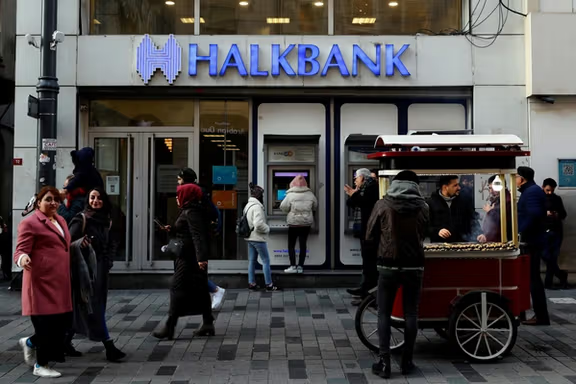
Turkey's state-owned Halkbank has asked the US Supreme Court to review a lower court decision that allows it to be prosecuted for allegedly helping Iran evade American sanctions, a lawyer for the bank said on Monday.
The Supreme Court had set a Monday deadline for Halkbank to file a petition appealing the October 2024 ruling by the 2nd US Circuit Court of Appeals in Manhattan, which cleared the way for the prosecution.
In a letter to the appeals court, Halkbank's lawyer Robert Cary confirmed the petition had been filed, though it was not immediately available on the Supreme Court's website.
Halkbank has pleaded not guilty to charges of fraud, money laundering, and conspiracy, accused of using money servicers and front companies in Iran, Turkey, and the United Arab Emirates to circumvent US sanctions.
US prosecutors allege that Halkbank facilitated the secret transfer of $20 billion in restricted Iranian funds, converted oil revenue into gold and cash for Iranian interests, and fabricated documentation for food shipments to justify oil proceeds transfers.
The case, initiated in 2019, has strained relations between the US and Turkey, with Turkish President Tayyip Erdogan denouncing it as an "unlawful, ugly" step.
However, both Erdogan and US President Donald Trump reported a productive phone call on Monday, with mutual invitations to visit their respective countries.
It is Halkbank's second appeal to the Supreme Court. In 2023, the court ruled that while the Foreign Sovereign Immunities Act of 1976 shields foreign countries from civil liability, it does not extend to criminal cases.
The Supreme Court then instructed the 2nd Circuit to further examine whether common law immunity protected Halkbank, leading to the October ruling that the bank could be prosecuted.
Trump maintains his so-called maximum pressure campaign against Iran, threatening secondary sanctions and targeting those aiding sanctions evasion, while indirect nuclear talks between the US and Iran continue.
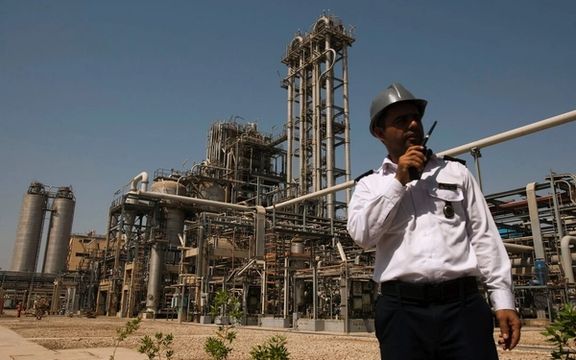
Iranian methanol exports to China could come under US scrutiny after Washington warned of secondary sanctions on Iranian oil and petrochemicals buyers while nuclear talks continue, Bloomberg reported on Tuesday.
About 40% of China’s methanol imports — some 5.2 million tons in 2024 — came from Iran, data from shipping analytics firm Kpler shows.
Methanol, used to produce plastics, is a key feedstock for China’s methanol-to-olefin (MTO) plants, which are major buyers of Iranian cargoes, according to ICIS, a global market intelligence firm.
"Iranian methanol is almost the only efficient way for coastal MTO units to get enough supply," said Ann Sun, senior analyst at ICIS.
US President Donald Trump last week said countries or firms that buy Iranian oil or petrochemicals could face immediate sanctions. The US has already targeted Iranian energy exports and Chinese refineries allegedly involved in such trade.
Although some Iranian methanol reaches China via third countries like the UAE or Oman, further sanctions could disrupt flows.
The latest move by Trump comes as he is squeezing Iran amid ongoing indirect nuclear talks between the US and Iran. They have now passed the third stage and are awaiting the fourth round in Oman.
Iran says that lifting sanctions is a priority in the nuclear talks.

Iran’s Foreign Minister Abbas Araghchi is set to visit New Delhi on Thursday amid rising tensions between India and Pakistan after last month’s attack on tourists in disputed Kashmir.
Araghchi is currently in Pakistan, where he met with his counterpart Ishaq Dar. He is also scheduled to hold talks with President Asif Ali Zardari and Prime Minister Shehbaz Sharif.
Last month, five armed militants attacked tourists in the Baisaran Valley near Pahalgam, in Indian-administered Jammu and Kashmir, killing 26 civilians, including 25 Indian tourists and one local Muslim pony ride operator.
In the aftermath, India accused Pakistan of supporting cross-border terrorism, an allegation Pakistan denied.
Iran offered to mediate between India and Pakistan, though New Delhi has rejected any third-party mediation, according to The Times of India, citing government sources.
The report said that Araghchi’s visit on Thursday was organized before the attack in Kashmir and is focused on co-chairing the Iran-India Joint Commission meeting alongside Indian External Affairs Minister S. Jaishankar.
Discussions are expected to center on trade, energy, and infrastructure cooperation.
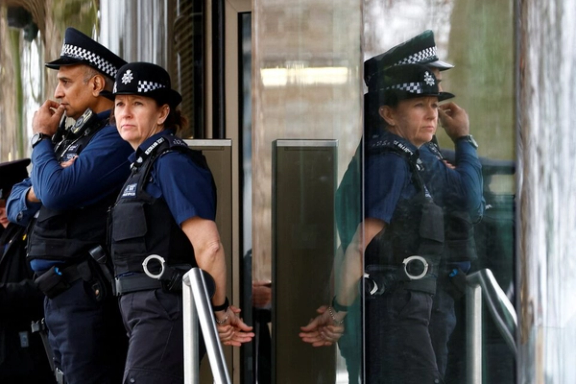
British counter-terrorism police have arrested seven Iranian nationals in two separate investigations, one of which involved an alleged plot to carry out a terrorist act targeting a specific location in England.
The first operation on Saturday led to the arrest of five men—aged between 29 and 46— in coordinated raids across Swindon, west London, Stockport, Rochdale, and Manchester, according to the Metropolitan Police.
Four of the men were identified as Iranian nationals and detained under the Terrorism Act of 2006. A fifth man, whose nationality was not disclosed, was arrested under the Police and Criminal Evidence Act. All remain in custody as searches continue at multiple addresses across England.
“We are working closely with those at the affected site to keep them updated. We are exploring various lines of enquiry to establish any potential motivation as well as to identify whether there may be any further risk to the public,” said Commander Dominic Murphy, head of the Met’s Counter Terrorism Command.
Officials have not disclosed the nature of the suspected target or whether any weapons or materials were seized, citing operational sensitivity.
In a separate investigation, police arrested three more Iranian nationals in London on the same day as part of a counter terror investigation. The men were detained under Section 27 of the National Security Act 2023, which authorizes arrests based on suspected “foreign power threat activity.”
The two operations were not connected to each other, police said.
The arrests come as UK intelligence services warn of sustained threats linked to Iran.
In October, MI5 Director General Ken McCallum said authorities had disrupted 20 “potentially deadly” plots tied to Tehran since January 2022.
“Iranian state actors make extensive use of criminals as proxies—from international drug traffickers to low-level crooks,” McCallum said in a public statement.